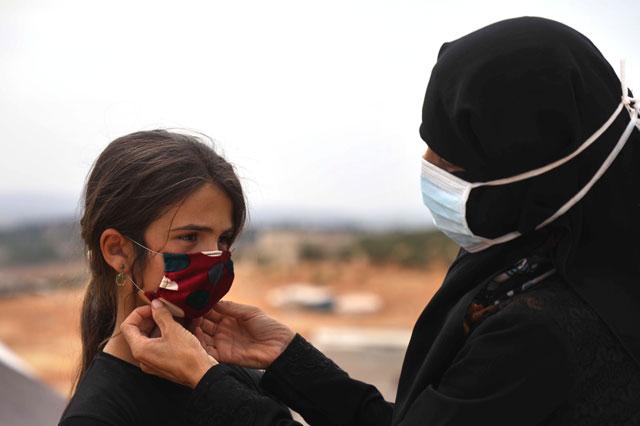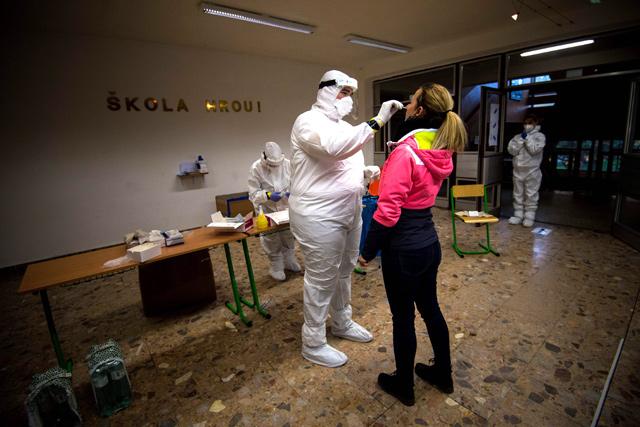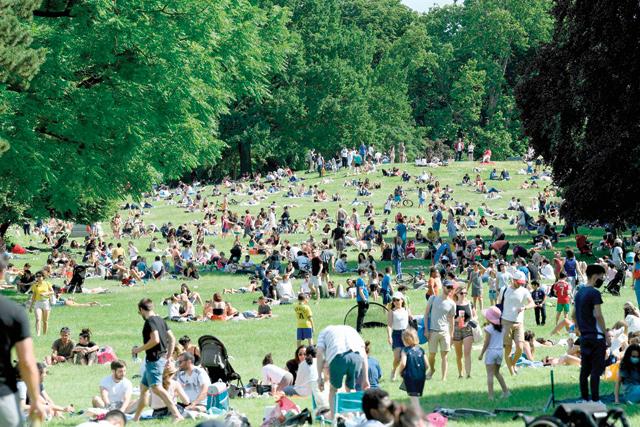You are here
Global virus deaths near 650,000 as new surges prompt fresh curbs
By AFP - Jul 27,2020 - Last updated at Jul 27,2020

Thirty-years-old displaced Syrian woman Umm Hussein fits a face mask she sewed on the face of a child at a camp for the internally displaced people near the town of Maaret Misrin in Syria's northwestern Idlib province on Monday amid the COVID-19 pandemic crisis (AFP photo)
PARIS — Recorded deaths from the coronavirus neared 650,000 on Monday as the disease surged back at hotspots in Asia, Europe and the Americas, prompting renewed restrictions, targeted lockdowns and compulsory mask wearing orders.
Australia has been rocked by its deadliest surge since the start of the pandemic, Hong Kong is experiencing record daily numbers and Spain's caseload has tripled in the last fortnight.
With the new surges prompting some states to mull new border closures, the World Health Organisation advocated instead for well-studied localised strategies.
"Continuing to keep international borders sealed is not necessarily a sustainable strategy for the world's economy, for the world's poor, or for anybody else," Michael Ryan, WHO emergencies director, told journalists in a virtual briefing.
A "global one-size-fits-all policy" is impossible because outbreaks are developing differently in different countries, he added.
The WHO also said Monday that experts would meet this week to discuss downgrading COVID-19's emergency status, six months after it was declared.
Worrying surges
China reported its highest number of coronavirus cases in three months, part of a worrying swell of second and third-wave infections that are hitting Asia and Europe.
Indonesia confirmed its 100,000th coronavirus case as the Red Cross warned that the health crisis in the world's fourth most populous country risked "spiralling out of control".
New infections have also snowballed in Hong Kong, which seemingly had a lid on local transmissions for weeks.
Now everyone in the densely populated territory must wear masks in public from this week, authorities said as they unveiled the city's toughest social distancing measures yet.
For its part, Belgium announced tougher measures against the virus after recording 1,952 new cases over the past week, a more than 70 per cent increase over the previous week.
From Wednesday, Belgians will be allowed to see a maximum of five people outside their families, reducing the permitted “social bubble” from 15.
Summer travel concerns
Britain’s biggest tour operator TUI has cancelled British holidays to mainland Spain from Monday until August 9 after the UK government’s decision to require travellers returning from the country to quarantine.
France ordered nighttime curfews for beaches in the Brittany resort of Quiberon on the Atlantic coast, after a fast-spreading COVID-19 cluster emerged there last week.
Bavaria said it will set up coronavirus test sites at its two biggest railway stations, in Munich and Nuremburg, as well as at key points on motorways near the border with Austria, as fears grow that summer travel could spark a new wave of infections.
Tehran warned Iranians against holding wedding and funeral gatherings as the coronavirus outbreak showed no signs of abating in the Middle East’s hardest hit country.
Towards a vaccine
The new surges come as laboratories around the world scramble to develop an effective vaccine, with the US firm Moderna to begin a final phase of clinical trials on Monday.
Meanwhile, some regions are still battling their first waves after never getting the virus under control: The US alone has recorded almost 4.23 million cases of COVID-19, while infections in Latin America and the Caribbean surged.
Worldwide the confirmed case count has passed 16 million, although experts believe that figure is vastly short of the true number.
China — where the coronavirus was first reported in December last year — recorded 61 cases on Monday, the highest daily figure since April, and authorities have declared “wartime mode” lockdown measures.
Most of the 57 new domestic cases were in the far northwestern Xinjiang region.
A second programme of mass testing was launched Sunday in Urumqi, the regional capital of 3.5 million people to check residents who had previously tested negative.
Australia on Sunday suffered its deadliest day since the pandemic began, with 10 fatalities and a rise in new infections despite an intense lockdown effort.
As worldwide infections passed 16 million, Latin America and the Caribbean totalled more than 4.34 million, according to an AFP tally, briefly surpassing North America, where the United States remains the hardest-hit country in terms of both caseload and death toll.
But North America soon moved ahead again, as the US recorded more than 55,000 new cases in 24 hours for a total of nearly 4.23 million.
Combined with Canada’s 116,000 cases, North America now has more than 4.34 million infections.
In Latin America, Brazil is the worst-hit country with almost 2.42 million cases and more than 87,000 deaths.
There have also been increases in infections in Mexico, Peru, Colombia and Argentina, all of which are trying to resume economic activities.
The British government, meanwhile, prompted by the coronavirus crisis, has renewed efforts to tackle the country’s obesity problem, requiring restaurants to display calorie counts on their menus among other measures.
Analyses show that nearly eight percent of critically ill patients in intensive care units with COVID-19 were categorised as morbidly obese, compared with less than three percent of the general population.
Related Articles
WASHINGTON — The United States saw a record number of new coronavirus infections for the second day running Friday, with more than 94,000 ca
GENEVA — The World Health Organisation warned Monday that there could be no return to normality any time soon as too many countries were bun
MOSCOW — Countries across Europe took bolder steps in easing coronavirus lockdowns, with schools, pubs, parks and pools reopening in places,














